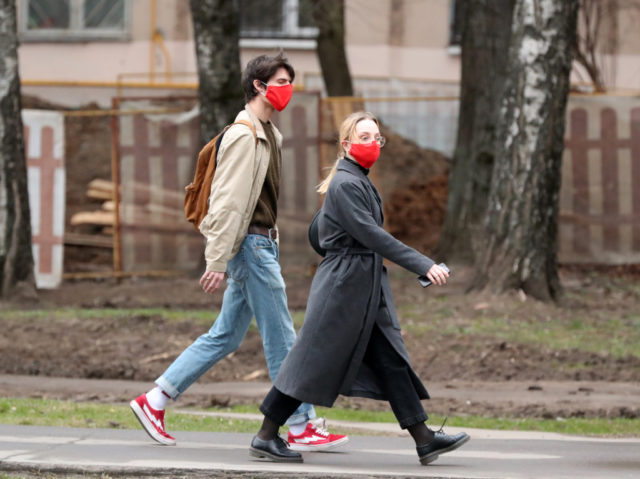
Russian Population Does Not Trust the Authorities but Still Believes the Propaganda
Publication: Eurasia Daily Monitor Volume: 17 Issue: 58
By:

The coronavirus pandemic has exposed a growing public mistrust toward the Russian authorities. But at the same time, most Russians still believe state-promoted anti-Western conspiracy theories.
The situation around the COVID-19 coronavirus pandemic in Russia is becoming increasingly tense. Russian officials now admit that existing tests were sometimes inaccurate, and the true number of patients may far exceed official numbers. So, in mid-April, doctors from the self-organized Clinical Committee for the Control of Coronavirus, in Moscow, proposed including hospitals for the treatment of coronavirus and pneumonia in a single system. According to them, at present, the vast majority of cases of pneumonia are caused by the new virus—even if existing tests give a false negative result. (Znak.com, April 9).
In addition to the fear of the pandemic, Russians have already felt the effects of the (partially) associated economic downturn. Almost 50 percent of working Russians reported a significant drop in family income since the beginning of the spread of the novel coronavirus (RBC, April 13).
Against the background of the double-crisis, both the Russian government and President Vladimir Putin have observed a drop in their public support. In March, the Levada Center first began to note declines in the ratings accorded to three key state institutions: the president, the government and the prime minister (Levada.ru, March 30). A later survey, from April, showed a decrease in the levels of public sympathy and positive attitude toward Vladimir Putin of four and three points, respectively, compared with October of last year (Levada.ru, April 14). Sociologists warn that social unrest is possible as a result of ineffective government support for citizens (Forbes—Russian service, March 31; see EDM, April 27).
A growing mistrust toward power is also reflected in the unwillingness of Russians to comply with the state’s quarantine mandates. Even the pro-Kremlin Nezigar Telegram channel concedes that the application of emergency measures does not enjoy the support of the population and has thoroughly eroded the ratings of state institutions (T.me/russica2, April 10). Similar data appears in materials published by MBK Media. Accordingly, people are annoyed by the government’s restrictions and perceive these actions as pressure, an occasion for new repressions and an excuse for certain individuals to corruptly profit (MBK Media, April 10).
However, a drop in the level of trust in the authorities does not mean that a majority of Russians is ready to advocate for liberal transformations. Along with distrust toward the government, Russian citizens still broadly believe various anti-Western conspiracy theories. Moreover, the general bitterness from a new round of economic difficulties, combined with the fear of the spreading pandemic, greatly increase such susceptibility, compelling many Russians to look for simple explanations and external enemies to blame.
Regional correspondents of MBK Media, talking about the causes of the pandemic with ordinary people, note that most mentioned “the conspiracy of the West, the uselessness of masks, fraud for the sake of raising prices, the benefits of ginger and God’s punishment” (MBK Media, April 10). Conspiracy theories about a British or American origin of the virus as a “biological weapon,” broadcast even by state-run Russian media, likely prompted such ideas (ВВС—Russian service, April 9). Even more radical theories are spreading among the far-right audience in Russia, including that the “World Government” provoked a pandemic in order to eliminate the “extra” population, justify genocide, weaken the state and control a reduced populace (Regnum, March 31).
Moreover, according to the Lev Gumilyov Center, xenophobic moods have now been growing in Russia for the second year in a row. Since 2017, adherence to ethnically motivated discrimination has risen from 54 to 71 percent, which is approaching the indicators of the “pre-Crimean” period of 2012–2013, and every second Russian now supports the slogan “Russia for Russians” (Gumilev-center.ru, April 8). Amid the economic downturn and increased competition for jobs, combined with the fears of the “foreign” origin of the coronavirus, nativist animosity toward migrants is highly likely to grow. At the same time, the political sympathies of the Russian majority are increasingly shifting to the radical left, reinforcing nostalgia for the Soviet Union (see EDM, January 15).
The coronavirus outbreak in Russia has also revealed other problems for the authorities, while increasing the population’s own understanding of these issues. According to the observations of Alexander Nevzorov and other Russian journalists, a spontaneous awareness of the situation and dissatisfaction with the government’s actions in all walks of life are growing (Svoboda.org, April 6). This awareness, paradoxically, does not contradict Russians’ belief in conspiracy theories or their view of Russia as a “besieged fortress.” Rather, these tropes harmoniously fit an increasingly widespread (even among more and more ordinary people) conviction that the Kremlin and especially Russian oligarchs (sometimes even Putin himself) are “agents” of the hostile West (YouTube, March 31, 2018). As an alternative to the current authorities, these people dream of a “real Stalin” and a truly popular government, capable of both building social justice and finally protecting Russia from numerous “enemies.”
Until recently, the risk that the Russians who hold such views would take part in street protests was minimal. However, against the backdrop of new restrictions and rapidly deteriorating epidemiological and economic conditions, it is becoming increasingly possible. Meanwhile, the Russian special services (siloviki), which in recent decades had succeeded in largely neutralizing the liberal opposition, have no idea how to deal with the chaotic and uncontrolled movement of disparate but embittered individuals who hold divergent views but are united in their dissatisfaction with the government. As a result, after years of suppressing “intellectual” protest activity, the authorities may now encounter a much more dangerous phenomenon for them—a “meaningless and merciless” Russian rebellion.



